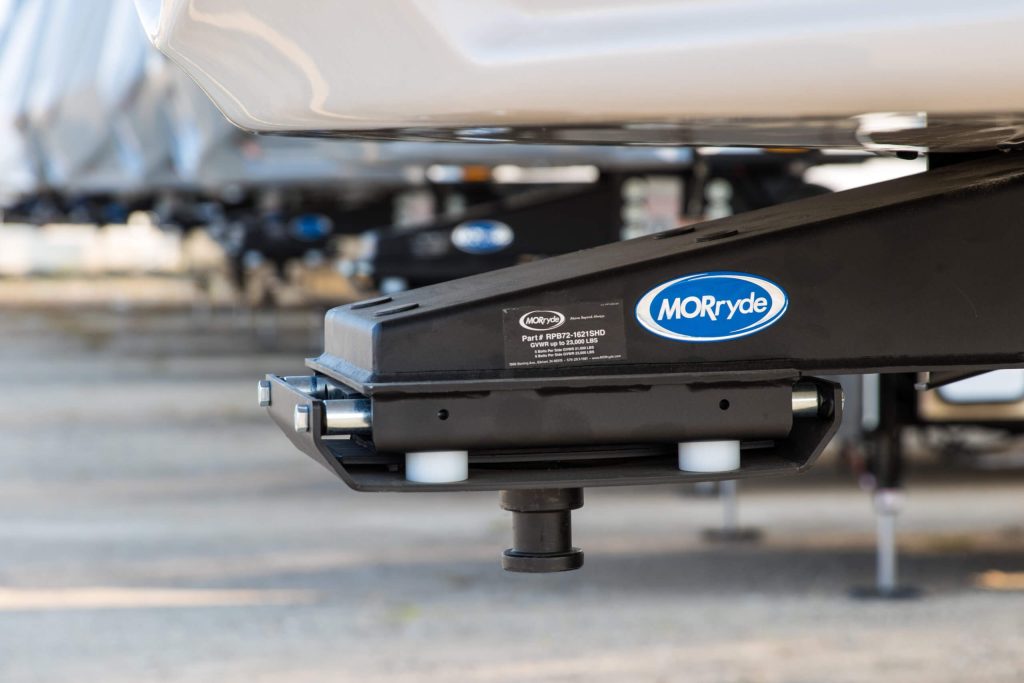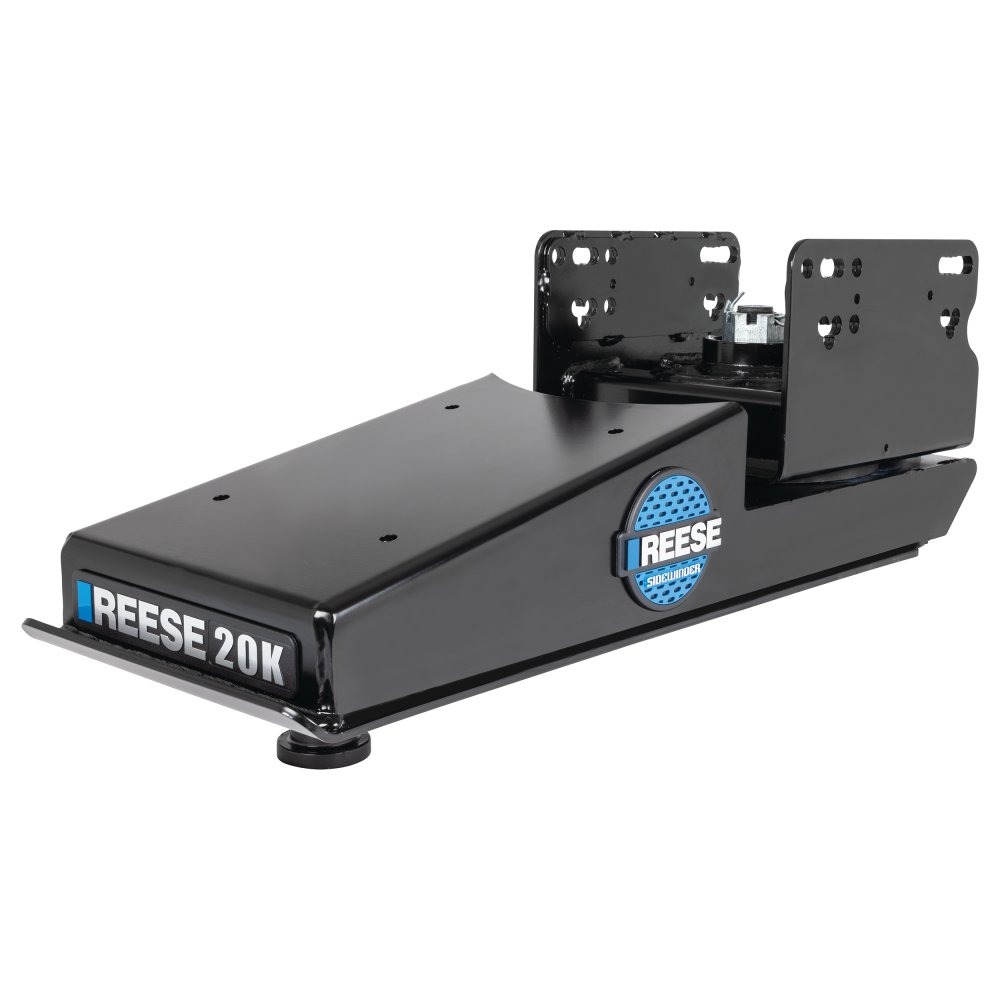Hearing rumors about widespread frame flex causing RVs to break? Want to know what you can do to protect your RV? Josh the RV Nerd has done a deep dive talking to RVers, chassis builders, and raw material suppliers to get to the root of the problem.
An RV is a big investment. At Bish’s, we want to help you protect that investment and stay safe on the road.
Below we’ll explain what frame flex is and when frame failure begins. We’ll provide steps you can take as an owner to help protect your RV and suggest the changes we believe RV dealers and manufacturers should make to keep everyone safer on the road and campsite.
What is Frame Flex?
If you’re thinking about buying an RV, or already own one, it’s important to understand what frame flex is and isn’t.
Frame flex has become a common phrase, but when the frame brakes we’re not actually talking about frame flex. In fact, If a frame doesn’t have some flex it’ll snap!
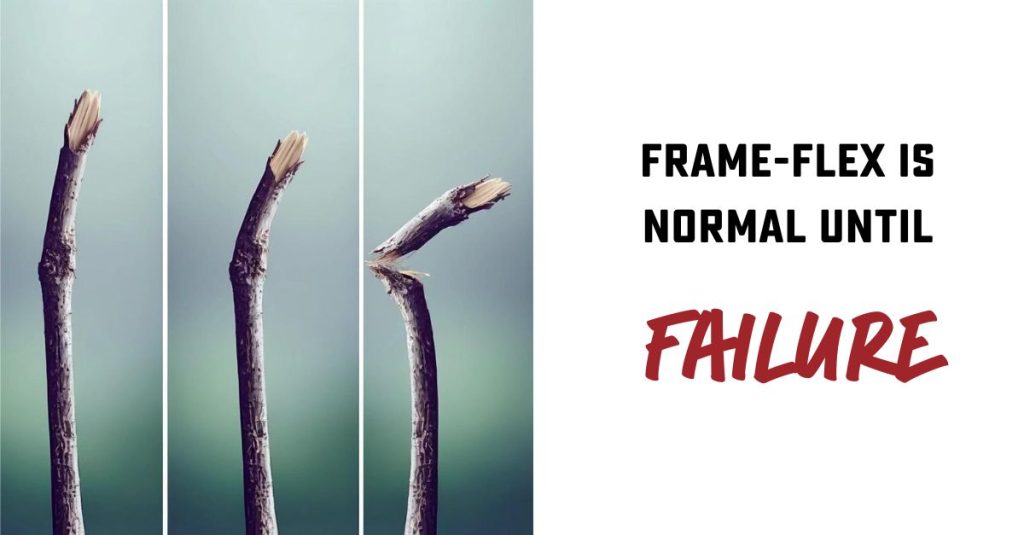
What we’re actually talking about is frame failure – frames flexing past normal until they can’t support your RV the way they should.
Frame failure is possible for any kind of RV. But, the problem seems to be mostly in 40’+ 5th wheels and toy haulers – especially ones that are moved frequently.
How Often Do RVs Have Frame Flex Issues?
More than anyone thinks they should! Of course, we wish we could say it never happens, but, unfortunately it does.
Online reports of this problem seem widespread. But, RV manufacturers report it happening in less than ½ of 1% of RVs.
The personal stories and experience of RVers show us there is an issue that needs to be addressed and improvements made. Manufacturer reports provide some perspective showing the problem of frame flex is very real, but fortunately not as widespread as it may seem.
Where on an RV Does Frame Flex Happen?
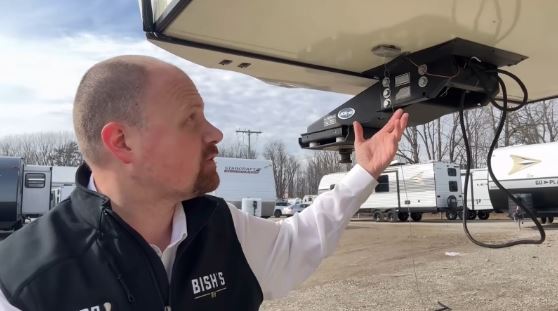
Most cases of frame flex show up in the pin box. This is where a 5th wheel attaches into the hitch in your truck bed.
If the pin box starts moving slightly independently from the RV as you’re moving down the road, there’s a problem. This is not supposed to happen and the RV will move in ways it shouldn’t as it’s pulled.
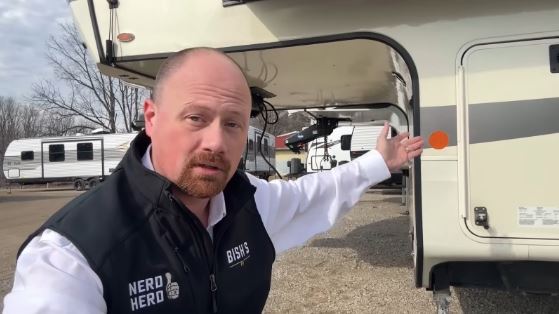
Some cases are seen at the riser – where the 5th wheel goes from the lower level to the higher level.
Again, most frame failure cases show up in very large 5th wheels or toy haulers that are moved around a lot. It is possible to find cases in smaller RVs or RVs used less often. But, it’s uncommon.
How Do You Know if an RV has Frame Flex?
Cracked Exterior
One very clear sign is a crack in the fiberglass. This is usually around the slide(s) since it’s where the RV has the highest amount of stress.
Cracks can appear in other parts of the exterior, so keep an eye out all over your RV.
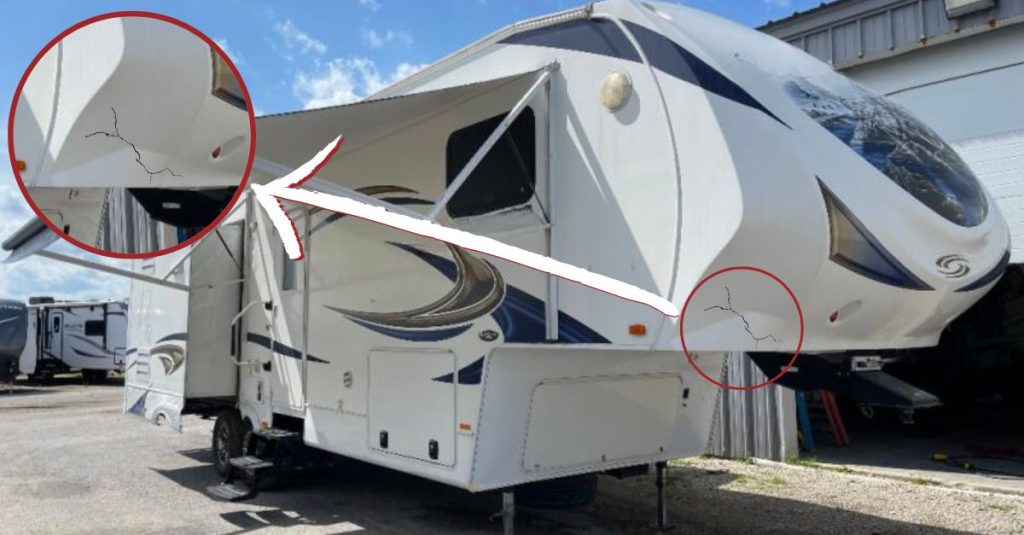
Pin Box Movement
If the pin box is moving, twisting, or flexing differently from the rest of the RV, it’s a problem.
If your pin box is compromised you may see the hitch move upward when you lower the pin onto it. This happens because the pin box structure isn’t flat and rigid like it should be to support your 5th wheel.
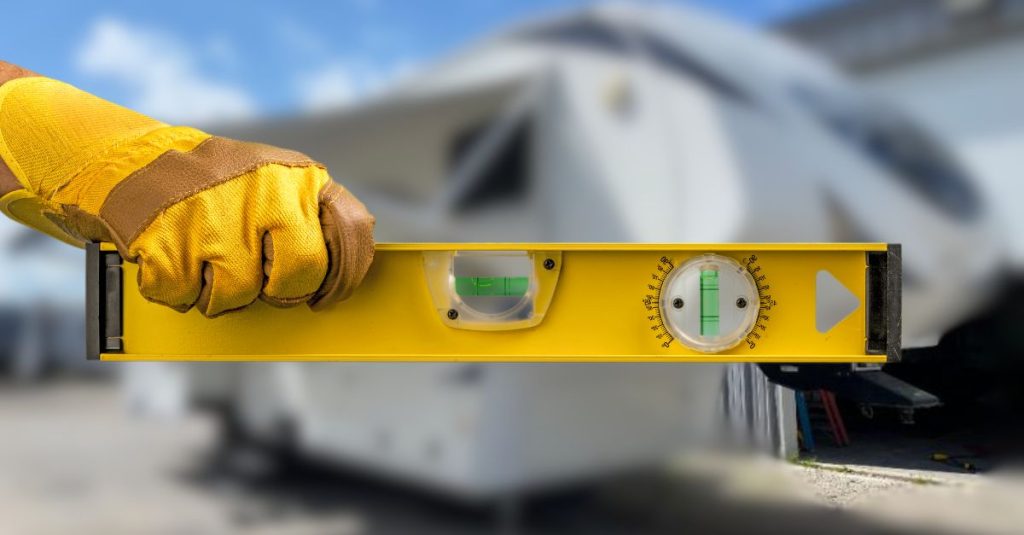
More Signs of Frame Flex
- Bowing walls
- Warping floors
- Cabinetry and trim popping loose or moving out of shape
- Leaks around fixtures like windows or speakers
The Causes of RV Frame Flex & How You Can Avoid Them
Concerns About RVs Built With Bad Steel
The RVing community has raised concerns about the steel used to build RVs. Especially steel used during the pandemic when there was a rush on RVs.
Josh the RV Nerd even expected to see higher reports of frame flex on the RVs built between 2020 and 2022.
Well, good news for RV owners: Josh was surprised to find out there hasn’t been an increase during these years.
This doesn’t mean no RVs have experienced frame flex from bad building materials. It’s not common, but even before the Covid RV rush, there would be an occasional RV built with bad steel.
But, while some RV frames may have failed from bad steel in the last few years, it doesn’t seem to be a main cause.
How to Avoid Buying an RV Made with Bad Steel
The huge majority of RVs will never have a problem where the steel for the frame just flat out fails. But we can’t deny that even with reputable manufacturers – it’s happened.
Josh has seen it happen a few times over the years and the manufacturer of the RV has usually stepped in to make things right. Even still, not 100% of customers have been totally happy with the final result.
The risk is very small, but the only thing you can do to prevent it completely is to not buy an RV.
If the lightning strike sized risk of a poor RV frame is a deal breaker for you, we understand. The whole reason we want to share this information with you, is so you have the knowledge you need to make a solid decision for you and your loved ones.
Even if that decision is not to own an RV. Check out our article on reasons NOT to buy an RV if you’re trying to decide if RV ownership is the best thing for you.
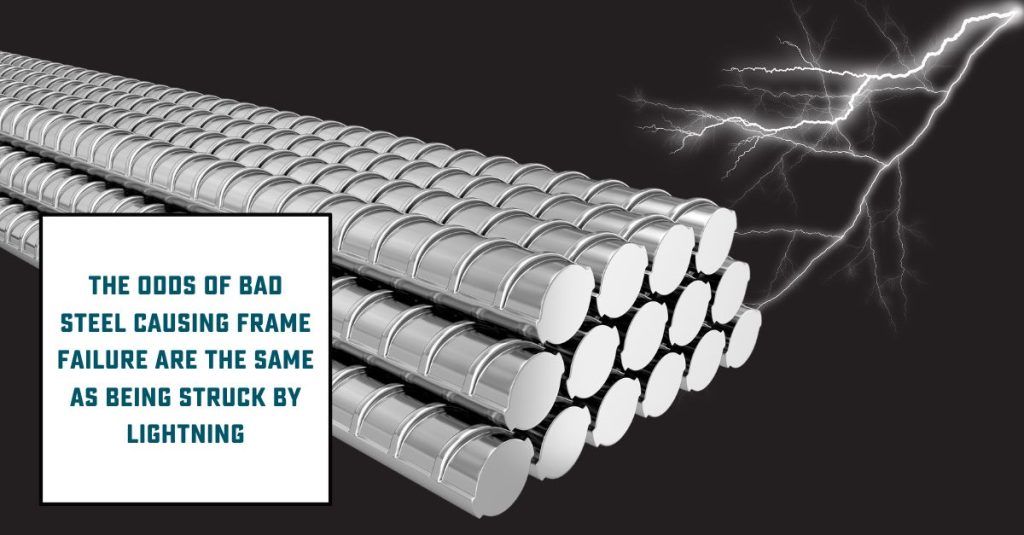
Overloaded RVs Are More Likely to Fail
It’s possible for an RV to get too heavy for its frame. An overloaded 5th wheel may get overstressed and stop working properly, especially when towed over multiple trips.
Most RVers don’t scale their RVs very often. Over time your camper can slowly fill up with extra weight. Little additions here and there, several bags of rocks your 4 year old hid in the bunks, etc can add up faster than you expected.
It’s easy to overlook your camper’s weight inching above the CCC (Cargo Carrying Capacity).
But! It’s not as simple as “RVers are loading too much into their RVs!” Manufacturers also play a role in this problem. Stay with us, or skip ahead, to find out more about what manufacturers can do to help this situation.
How to Prevent Overloading Your RV
Weigh Your Empty RV
Josh recommends scaling your RV immediately after you buy it. It’s best to have it dead empty when you weigh it so you can get a baseline for how much weight your RV can handle.
Please note: Your RV’s brochure weight and real weight are not the same thing.
Some manufacturers will weigh each RV as it comes off the line and tag the RV with its actual weight. Kudos to those manufacturers for looking out for customers. Because most don’t do this and it’s not required!
A manufacturer only has to weigh one finished RV, then weigh the different options that could be added to that RV to know it stays within GVWR (Gross Vehicle Weight Rating).
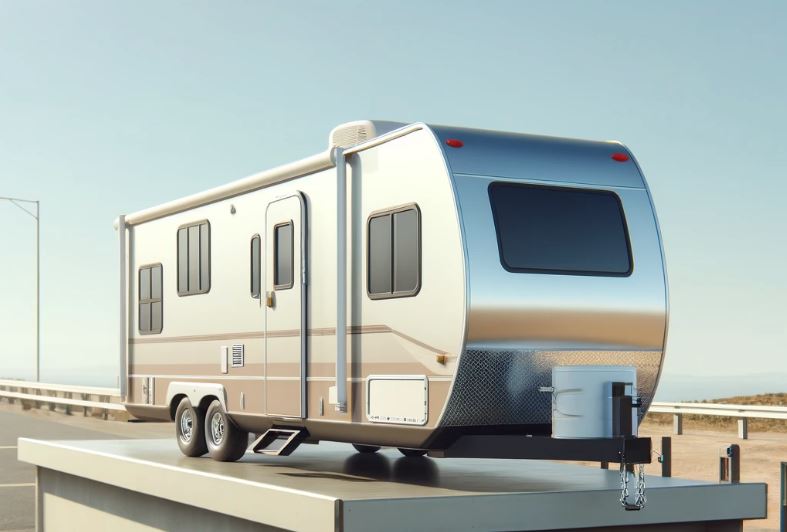
Some changes, like generators, may be added after the RV is built. They can also change your hitch weight.
It’s very common to weigh your RV immediately after buying only to find the real hitch weight is heavier than the weight in the brochure. Without that check in, you may add more weight than your camper can handle without ever knowing it.
Weigh Your RV at Least Once a Year
A yearly check in can help you make sure your RV isn’t heavier than its frame can handle.
For example, Josh worked with a gentleman who saw his axles were bowing and his tires were wearing funny. He scaled the RV and found his RV was overweight.
The man cleaned out the RV and found out he had 2 Crock-Pots on board!
Sometimes the solution really is as simple as a little decluttering session.
Need help scaling your RV?
Search “trailer scales near me” to find a scale nearby. You’ll likely find options like “CAT Scales,” or similar trailer weighing services in your area.
Check Youtube or visit CAT Scale’s site for help learning how to properly weigh your RV.
Unapproved Pin Box Swaps Can Damage Your 5th Wheel Frame
The pin box is the most common place to have flex issues.
Some RV owners swap their factory approved 5th wheel pin box for one that’s not approved for their RV’s chassis.
It makes sense that someone traveling a lot with their 5th wheel would want to swap out a pin box for something that makes the ride smoother or easier. But, a lot of owners don’t realize that all pin boxes aren’t created the same.
A 5th wheel’s chassis is designed to support specific types of towing movement and converting your pin box could cause frame flex.
Unfortunately, many dealers or service centers either aren’t fully aware or are just happy to take your money and swap a pin box without educating you on the risks.
We’ve unknowingly done this at Bish’s. We are learning, growing, and making changes as soon as we realize. We’re now redoing our processes on pin box changeouts to do a better job protecting RVers.
We’re educating our staff on this so they can provide better information about the potential dangers of making a hitch swap. If you do decide you want to swap your pin box, we’ll make sure you understand the side-effects and risks. This way you can make a decision with your eyes completely open to possible problems.
How You Can Prevent Pin Box Frame Flex
Whenever possible, don’t swap out your pin box. If you do make a change, make sure you’re choosing something that is approved by the manufacturer.
You can find out if the swap is approved by getting the VIN number for your RV (or the one you’re looking to buy) and calling the manufacturer to ask if any other pin boxes are approved for that model.
Knowing what swaps are available before you buy can help you know if that’s a good RV for you. Unfortunately too many of us haven’t been aware of this in the past. We’re going to do all we can at Bish’s to educate RV buyers and owners more about this going forward.
Tow Vehicle Matters
Josh the RV Nerd has said a time or 10, “you can’t have too much truck,” but he learned that’s not quite true! Turns out it’s actually possible!
In a small minority of frame flex cases, RVers have used non-traditional tow vehicles – like a semi-trailer.
A truck and a semi-trailer use the same hitching system. This means a semi can easily hook up to and carry a 5th wheel.
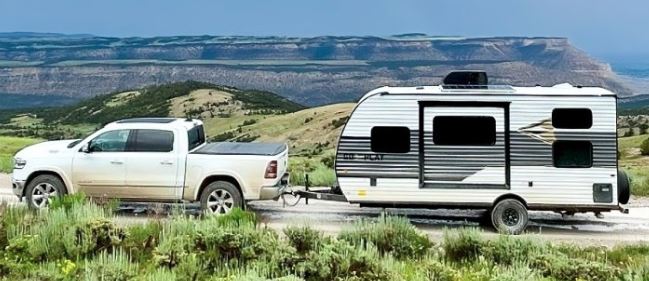
While it’s possible to hitch to a semi, 5th wheel manufacturers build their RV expecting you’ll tow them with something like a 1-ton dually.
A 5th wheel’s weight is engineered to activate your truck’s suspension and reduce how much impact the RV gets from bumps along the road.
The suspension on a semi is built to handle much more weight. It’s stronger and more rigid. If you hit a bump the suspension on the truck isn’t as easily activated and the impact goes straight into the RV instead of being shifted into the truck.
This is why there have been some instances where using too much truck has led to frame flex.
But, as Josh asks, if even he didn’t know that until now, how were owners supposed to know it? Obviously more information needs to be available to RV owners to help them avoid this.
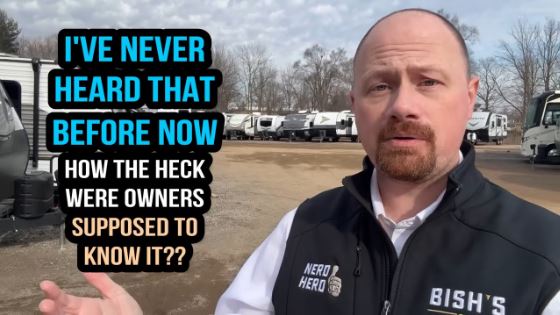
How You Can Make Sure Your Tow Vehicle is a Good Fit for Your RV
You have to have a pretty extreme truck before this becomes a problem.
Mainstream, big RVs are built to be towed by a traditional, one ton dually truck. If you get beyond that, it’s more likely you’ll have issues.
Frequent RV Trips Can Damage Your Frame
The last common thread Josh has found is taking frequent trips with the RV.
Did you know when manufacturers design and build RVs they have a certain amount of trips in mind for that RV?
A car warranty will tell you it’s good for so many years OR miles. How much any vehicle, including an RV, is used will impact its longevity.

There are manufacturers and dealers who market RVs as something you can be in all the time and move around every weekend, but that’s really not how they’re built.
This message is especially common with large 5th wheels. RVers may buy them to live and travel in long-term, never knowing how much use the RV is designed for.
But, like towing with a bigger truck, how is an owner supposed to know if they’re never told?
How Much Use is Your 5th Wheel Designed For?
The unfortunate truth is manufacturers don’t give specifics on how much an RV is supposed to be used. Towable RVs also don’t come with an odometer so it’s hard to pinpoint how much you’ve really used your camper.
An ABS system can count tire revolutions and help you understand how much use your 5th wheel has gotten. But customers deserve information from manufacturers on how much they expect an RV to be used, to use that information well.
Prevent Frame Failure: Get Educated Before You Buy an RV
A dealer without your best interest at heart may try to take advantage of you, or even a good dealer may give you wrong information. This is why it’s always a good idea to dive in and do what you can to educate yourself before you choose an RV.

Youtube, blogs, and manufacturer sites can help you learn more about your RV options.
Feel free to dive into the information we have available from Josh the RV Nerd or at our RV Learning Center. You’re always welcome to contact one of Bish’s RV outfitters with your questions or concerns
A Message to RV Manufacturers & Dealers: RV Buyers Deserve Better Information
“If more information was readily available and easy to access we would have far, far less of this!” – Josh
RV buyers need accurate, clear information without bias to make safe decisions.
Whether it’s an accurate hitch weight, the number of miles, or the type of terrain an RV is engineered for. Information gives RVers power to make the best decisions that protect their safety and wallet – and they deserve that.
This information exists, but it’s either too hard to find or too technical to take in. So much more information needs to be provided in ways that are easy to understand and use.
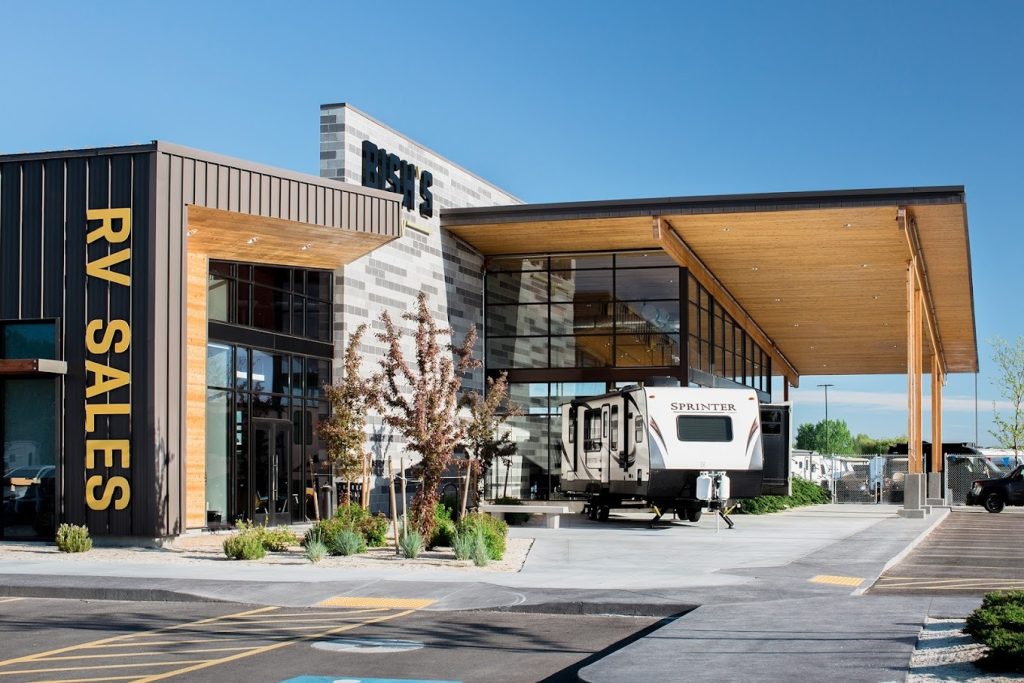
We’re not perfect here at Bish’s and we’re the 1st to admit it. We never intentionally give bad information, but we’re learning and growing and working to always give you the very best understanding we have.
Josh’s Message to RV Makers: “Provide more info more clearly”
We’d like to see RV manufacturers take steps to provide buyers more real, useful information.
Things like real specs, weights and measures, including that mystery hitch weight we talked about above could make a real difference.
A sticker with the empty hitch weight of each camper could protect RV owners and make towing an RV a safer, better experience.
Create and Share More Resources
Easy to access, simple to understand information would help RVers.
Josh tells the story of visiting a manufacturer’s website to find warranty information. The page was blank and encouraged the shopper to ask their dealer for information about the warranty.
It’s the manufacturer’s warranty! If they can’t tell you their own warranty, how can a dealer really provide that information accurately? Of course this isn’t true for all manufacturers. But it’s one example of how the RV industry could increase transparency.
Overall, we’d love to see a culture shift to make things much more clear for customers. We’re hard at work doing what we can at Bish’s, but we’re going to keep learning, sharing what we learn, and encouraging others to share more too.
Manufacturers like Grand Design provide your brochures and RV info in their myGDRV feature. We hope to see more, easy to find and understand information from manufacturers in the future. Especially more information on how the RV is designed to be used.
Improve Marketing and Messaging
So much RV advertising, especially for 5th wheels, focuses on full-time RVing and “four season” camping.
This message may set up an impossible dream the vehicles aren’t engineered to carry out. We definitely can’t fault an RVer for using a camper in a way the RV marketing implied they could use it.
Josh is on a mission. He’s asking manufacturers to reconsider what their marketing implies and make sure it’s the right message for RV users.
For example, did you know manufacturers classify living in an RV as something different than “full-time RVing”? Full-time and 4 season advertising suggests it’s possible, but overuse to a 5th wheel is a real problem and buyers deserve to know what real expectations are.
Basically, it boils down to 5th wheels are not meant to be towed every 2-3 days all year long. If you’re considering full-time RVing, make sure you check out Josh’s video long-term RV living.
Manufacturers, please set realistic expectations. Explain CLEARLY the expectation and intention of the rvs you make in plain, simple to read words buyers can quickly understand (nobody’s got time for long, legalese mumbo jumbo!).
A Message to RV Dealers
“Customers need us to be better”
RV Dealers aren’t off the hook either! Dealers interact with manufacturers and customers, so we have the greatest capacity to resolve these problems.
We need to lead the charge to educate customers accurately! Customers come to us because we’re supposed to be the educated ones. If we can’t steer them correctly, you can’t blame an RV owner for not knowing all the details on how to use their RV.
Most importantly, dealers, stop pushing false information! Don’t tell people a 35’ triple slide 5th wheel is half ton towable! Don’t push a 4 season agenda to make a sale! Don’t modify RVs or swap pin boxes without giving customers the education they need about possible consequences.
There are some really stellar RV dealers across the country. A good dealer will always prioritize your safety over their bottom line.
How can you tell if you’ve got a good dealer? The first step, if you’re shopping for a towable and they don’t ask what you’re towing with – run. That is not a dealer keeping your needs first.
We’re not perfect either. At Bish’s we’re constantly trying to improve. We have an internal training system and we’re always working to make better, more accurate information easy for customers to get.
Our blog is just one of the many ways we’re trying to get more RV knowledge in your hands. Feel free to subscribe to get updates to your inbox.
RV frame failure is an uncommon, but very serious problem. If you’re looking to own or already have a large 5th wheel, we hope you feel empowered to know how you can prevent frame flex on your RV.
We’re working hard at Bish’s to improve and provide a better experience for customers. Your safety and camping experience is our highest priority.
Our RV experts love to help, they’d be happy to answer any of your questions or help you find the right RV for you, your family, and your tow vehicle. You can also feel free to browse our inventory to see if we have the right camper or motorhome for you.
Read More
RV service stinks! RVFix is how we’re getting your RV fixed faster
How to find the lowest price for your RV and avoid paying hidden fees
10 questions to ask to find the right RV
Becki Johnson
Bish’s RV Content Editor & Writer
20 years in the RV industry and a lifetime around RVs have convinced me that nature is a lot better with a comfortable bed and working bathroom.
I love to use what I’ve learned to help RVers find the best RV for the best possible price.

